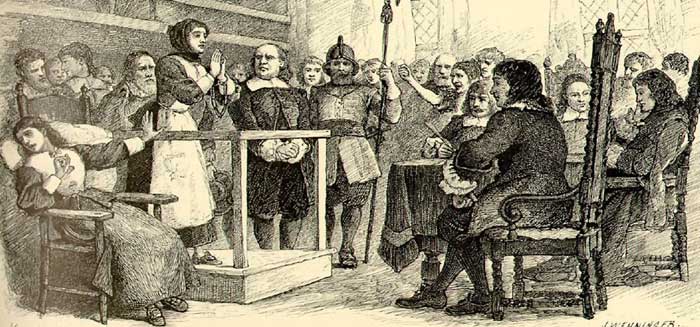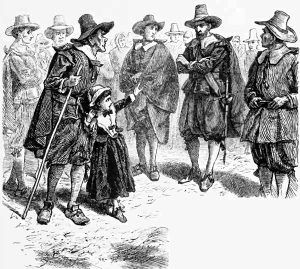Witches of Salem: Index A B C D E F-G H I-J K-N O-P Q-S T U-Z
Nehemiah Abbott, Jr. (1665?-??) – From Topsfield, Massachusetts, Nehemiah was accused and released at the preliminary examination.
Arthur C. Abbott (1639-??) – From Topsfield, Massachusetts, Arthur was accused and imprisoned. Results unknown.
Captain John Alden, Jr. (1623-1701) – A prominent sea captain and merchant, John Alden, was in his mid-sixties when he was accused of witchcraft on May 28, 1692. He was born to John Alden, Sr., and Priscilla Mullins Alden, who settled in Plymouth, Massachusetts, in 1620, arriving on the Mayflower. He grew up to be a sea captain, a Boston merchant, and a charter member of Reverend Samuel Willard’s Third Church in Boston.
There were several reasons that he might have become a target, including several scandals and controversies. He had connections with the Indians of Maine, allegedly trading with the Wabanaki Indians who had attacked English settlements in Maine.
There were also rumors that he was providing supplies to French enemies. His marriage to Elizabeth Phillips, who had inherited sawmills in Saco, Maine, strengthened his ties with that colony. For some of the young female accusers who had painful ties to Maine, where the Indian Wars had orphaned them, he was a perfect target.
Accused on May 28, 1692, Alden was arrested and imprisoned at the Boston jail. However, he soon escaped and fled to New York. He returned from New York and posted bail by the end of the year. By the time his trial was scheduled on April 25, 1693, the hangings had stopped, and his case was discharged. John Alden, Jr. died in Boston, Massachusetts on March 14, 1701.
“Those Wenches being present, who plaid their juggling tricks, falling down, crying out, and staring in people’s faces; the Magistrates demanded of them several times, who it was of all the people in the Room that hurt them? One of these Accusers pointed several times at one Captain Hill, there present, but spoke nothing; the same accuser had a man standing at her back to hold her up; he stooped down to her ear, then she cried out, Alden, Alden afflicted her. One of the Magistrates asked her if she had ever seen Alden, she answered no; he asked her how she knew it was Alden? She said the Man told her so.” — John Alden describing his examination.
Daniel Andrew (1643-1702) – From Salem Village, Daniel was accused of witchcraft but fled before he could be brought in. Accusations against Daniel Andrew, as well as Philip and Mary English, are thought to have been orchestrated by the powerful Putman family of Salem Village. Daniel was born to Thomas Andrew and Rebecca Craddock in Watertown, Massachusetts, in 1643. He moved to Salem Village in 1669, where he would live until his death. Working as a Bricklayer, he was involved in many projects in Salem Village, such as the building of the new town Hall, the Woodcock House, and other buildings in the community. In 1677, he married Sarah Porter, and the couple would have eight children. Daniel was active in the community, serving as Juryman in 1676, 1681, and 1684. He also served as a town Selectman for several years and constable in 1677.
Daniel Andrew and Philip English were prominent townsmen whose positions the Putman family wanted to hold. Further inducing the Putman wrath against Daniel Andrew was that he was related to Israel Porter by marriage, a long-time enemy of the Putnams. In 1689, Nathaniel and John Putnam were elected as Town selectmen, and Israel Porter, Daniel Andrew, and several others resigned in protest. In 1692, Israel Porter and Daniel Andrew were re-elected, and Philip English was added to their number. The Putman brothers were not re-elected. Suspiciously, just weeks later, warrants were issued against Daniel Andrew and Philip and Mary Hollingsworth English. Nine days later Thomas Putnam and his brother-in-law, Jonathan Walcott, submitted a complaint against Philip English, followed up with a complaint against Daniel Andrew on May 14, 1692.
Thomas Putnam wasn’t generally in the habit of making accusations; rather, he facilitated the accusations of his family and neighbors. Members of his family who accused Daniel Andrew included Ann Putnam, Jr., Mary Walcott, and Mercy Lewis. Once these accusations were made and seeing what had happened to others accused, Daniel Andrew fled before a warrant could be issued for his arrest. Sometime later; however, he returned, probably after the hysteria died down. He resumed his role as a town selectman in 1701 and 1702, when he died.
Compiled by Kathy Alexander/Legends of America, updated April 2023.
Also See:
The Salem Witchcraft Hysteria (Main article)
Procedures, Courts & Aftermath


